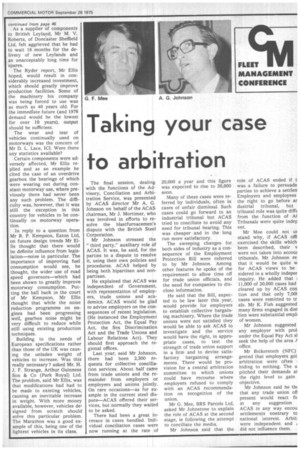Taking your case to arbitration
Page 53

If you've noticed an error in this article please click here to report it so we can fix it.
The final session, dealing with the functions of the Advisory, Conciliation and Arbitration Service, was presented by ACAS director Mr A. G. Johnson on behalf of the ACAS chairman, Mr J. Mortimer, who was involved in efforts to resolve the blastfurnacemen's dispute with the British Steel Corporation.
Mr Johnson stressed the "third party," auxiliary role of ACAS. It was, he said, for the parties to a dispute to resolve it, using their own policies and procedures. ACAS helped by being both bipartisan and nonpartisan.
He explained that ACAS was independent of Government, with representation of employers, trade unions and academics. ACAS would be glad to advise employers on the consequences of recent legislation. (He instanced the Employment Protection Act, the Equal Pay Act, the Sex Discrimination Act and the Trade Unions and Labour Relations Act). They should first approach the regional offices.
Last year, said Mr Johnson, there had been 2,300 requests for collective conciliation services. About half came from trade unions and the remainder from employers or employers and unions jointly. On rare occasions—as for example in the current steel dispute—ACAS offered their services, but normally they waited to be asked.
There had been a great increase in cases handled. Individual conciliation cases were now running at the rate of 20,000 a year and this figure was expected to rise to 30,000 soon.
Many of these cases were referred by individuals, often in cases of unfair dismissal. Such cases could go forward to an industrial tribunal but ACAS tried to conciliate to avoid any need for tribunal hearing. This was cheaper and in the long run more satisfactory.
The sweeping changes for both sides of industry as a consequence of the Employment Protection Bill were referred to by Mr Johnson. Among other features he spoke of the requirement to allow time off for trade union officials, and the need for companies to disclose information.
He said that the Bill, expected to be law later this year, would provide for employers to establish collective bargaining machinery. Where the trade unions were not satisfied they would be able to ask ACAS to investigate and the service would have the right, in appropriate eases, to test the strength of trade union support in a firm and to devise satisfactory bargaining arrangements. There would be provision for a central arbitration committee to which unions could have recourse where employers refused to comply with an ACAS recommendation on recognition of the union.
Mr G. Mee, BRS Parcels Ltd, asked Mr Johnstone to explain the role of ACAS at the second stage, ie following the attempt to conciliate the media.
Mr Johnson said that the role of ACAS ended if t was a failure to persuade parties to achieve a settlen Employers and employees the right to go before ar dustrial tribunal, but tribunal role was quite .diffE from the function of A( Tribunals were quite indep ent.
Mr Mee could not ur stand why, if ACAS offi exercised the skills which been described, their v were not taken into accour tribunals. Mr Johnson re. that it would be quite w for ACAS views to be sidered in a wholly indeper inquiry. He added that ! 11,000 of 20,000 cases had cleared up by ACAS con tion and that only 7,00( cases were remitted to tr als. Mr K. Fish suggested many firms engaged in dist tion were substantial empli of women.
Mr Johnson suggested any employer with prot under the Equal Pay Act sl seek the help of the area office.
Mr Bickersteth (NFC) gested that employers goi arbitration were often hiding to nothing. The u pitched their demands at the right level to gain objective.
Mr Johnson said he -au that any trade union ofl present would react fi€ at any suggestion ACAS in any way encou settlements contrary to national interest. Arbit: were independent and 1 did not influence them.




































































































